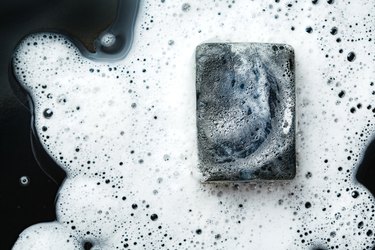
Don't confuse sodium carbonate with sodium bicarbonate. The latter is the standard baking soda you'd find in your cupboard, while sodium carbonate is an ingredient in dish soap, glass products and floor cleaners.
Sodium carbonate is also a food additive recognized as generally recognized as safe by the U.S. Food and Drug Administration. Sodium carbonate is sometimes called soda ash or disodium carbonate.
Video of the Day
Video of the Day
Tip
Sodium carbonate, or soda ash, is a common ingredient in many manufacturing processes and is also a food additive. It’s the disodium salt of carbonic acid, with a chemical formula of Na2CO3.
About Sodium Carbonate
Sodium carbonate occurs naturally on earth, but may also be manufactured by mixing sodium chloride (salt) with ammonia. Pick up sodium carbonate at grocery stores or at swimming pool supply stores as well as hardware stores. The grey-white powder or solid white powder is odorless and tasteless.
It's strongly alkali, or a base, on the pH scale. It's generally harmless when it comes in contact with the skin, but solutions made with it can be corrosive. While small amounts are not toxic, too much can cause poisoning. For the most part, however, sodium carbonate has a low risk of toxicity.
Symptoms of sodium carbonate poisoning as explained by MedlinePlus include:
- Breathing problems
- Diarrhea and vomiting
- Eye irritation
- Low blood pressure
Sodium carbonate is approved as a food additive according to the Food and Drug Administration. Its designated uses are as a curing and pickling agent, a flavoring agent, a pH agent and a processing aid. Levels to be used are "not to exceed current good manufacturing practice."
Read more: What Do Salt and Sugar Do to Your Body?
If you ingest sodium carbonate, you won't get a load of sodium (despite the compound's name.) Your intake of sodium from food is far higher. Oral consumption of sodium carbonate dissolved in water could act as an antacid. It neutralizes gastric acid in the stomach, explains PubChem, but it's not commonly prescribed for this use.
Uses of Sodium Carbonate
The National Library of Medicine Toxicology Data Network explains that sodium carbonate has a vast number of uses. You see it used in:
- The production of glass
- Water softener
- Soaps and detergents
- Metal and mining industry
- Pulp and paper industry
You may encounter sodium carbonate in laundry and dish washing detergent, floor cleaners, degreasers, cosmetics, scouring powders and soaps. Many major brands, including Clorox, Lysol, Seventh Generation, Tide, Arm & Hammer, Purex, OxiClean and Simple Green, use it in their products. Toothpaste often includes sodium carbonate to help raise mouth pH and act as a foaming agent, explains UC Davis.
As a food additive, sodium carbonate is commonly included in ramen noodles to give them a springy texture. It's also an ingredient in sherbet powder.
Sodium Carbonate vs. Sodium Bicarbonate
Sodium bicarbonate is just good, old baking soda, and it's often used in making baked goods or for cleaning and deodorizing purposes. It's also a valid treatment for minor medical issues such as insect bites and sunburn. Sodium bicarbonate is a similar compound, but isn't the same thing as sodium carbonate. The sodium bicarbonate formula is NaHCO3. Sodium bicarbonate is sometimes used in fire extinguishers or as an anti-fungal treatment for crops.
Although sodium carbonate has antacid properties, sodium bicarbonate is actually a prescribed medication to relieve heartburn and acid indigestion, according to Medline Plus. Sometimes, sodium bicarbonate as a medicine may be prescribed to reduce the acidity of your blood or urine. It's taken as a tablet or powder and consumed orally according to your doctor's instructions.
Read more: Baking Soda for Sore Muscles
Sodium bicarbonate, not sodium carbonate, has solid research behind its ability to boost exercise performance too.
In Current Sports Medicine Reports, researchers published a review in the July-August 2016 issue, noting that ingesting sodium bicarbonate can improve high-intensity exercise, including high-intensity interval training and skill-based sports. Doses need to be individualized, however, because not every athlete responds to the compound in the same way.
- U.S. National Library of Medicine: "Sodium Carbonate"
- MedLinePlus: "Sodium Carbonate Poisoning"
- UC Davis: "Sodium Carbonate"
- U.S. Fod and Drug Administration: "CFR - Code of Federal Regulations Title 21"
- National Library of Medicine Toxnet: "Sodium Carbonate"
- PubChem: "Sodium Bicarbonate"
- PubChem: "Sodium Carbonate"
- Current Sports Medicine Reports: "Recent Developments in the Use of Sodium Bicarbonate as an Ergogenic Aid"
- U.S. Department Health and Human Services: "Household Products Database"